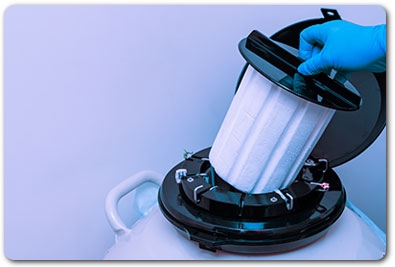The Government has this week launched a consultation seeking the public’s view on whether they should change the current law surrounding the storage of frozen eggs, sperm and embryos.
What does the law say?
 The current law is very (and we say unnecessarily!) complex. The law currently stipulates that if you freeze eggs, sperm or embryos then you must use them within 10 years of storage, unless you apply for that to be extended.
The current law is very (and we say unnecessarily!) complex. The law currently stipulates that if you freeze eggs, sperm or embryos then you must use them within 10 years of storage, unless you apply for that to be extended.
The legislation covering when you can have an extension of the 10 year time limit varies depending on a number of factors including when your gametes or embryos were originally stored and whether you opted into the new regulations which came into force in 2009. The law itself is spread across various pieces of primary legislation and secondary regulation, each with different nuances to what the law says under different circumstances. This makes it particularly difficult for patients and fertility clinics to work out whether they meet the criteria to apply for an extension of the 10 year time limit and if so, how they have to apply for that.
Does this cause issues in practice?
Yes. The difficulty with the complicated legislation means that different law can apply to different clients, and so it is extremely important that patients and clinics seek specialist legal advice if they are considering making an application for an extension to ensure that they operate under the correct piece of law.
This makes matters more complicated than they need to be, and can oftentimes result in patients being given incorrect advice due to a misunderstanding of the law which then causes them problems further down the line once the error has been identified.
The biggest problem caused is what we call “gap in time cases”, which is caused due to the regulations requiring the conditions for extended storage to be met before the current 10 year limit expires, meaning that in some cases it is too late to get the required evidence in place to make the application. In these cases patients can be forced to destroy their gametes and embryos due to what is essentially a paperwork gap, which we consider is extremely unnecessary given that these patients would otherwise meet the criteria.
What changes are being proposed?
The government is consulting generally about any options for reforming the law, and the consultation runs through a number of options for reform including abolishing the time limit altogether to making tweaks to the current legislation to make the law more straightforward for clinics and patients to understand. You can respond to the consultation using the link here.
What should be done?
Our view is that having an artificial timeline for storage is at odds with the generally accepted public interest of a woman’s right to have autonomy over her own reproductive decisions. It is well acknowledged that a woman’s eggs will be most fertile when she is in her 20s, and this time-limit turns the biological clock into a real one, with women who have made that decision required to ‘use it or lose it’ once they get into their 30s, which might still be too early for some who have chosen to do so.
Additionally, it draws an unnecessary line between those who ‘deserve’ to have access to their gametes or embryos after 10 years and those who do not. We consider that is unnecessary given the advancements in freezing technology.
We firmly support a review of the law to make it easier and more straightforward for both patients and clinics to understand. This could involve a number of options including a more straightforward ‘opt back in’ procedure which would allow storage to be renewed every 10 years on the condition that the patient is paying the clinic’s storage fees.
Those interested in responding to their government with their own experiences of gamete and embryo donation and freezing can do so here. If you are trying or thinking of applying for an extension of the time limit but have run into difficulties, you can arrange to speak to one of our specialist fertility solicitors by filling in our contact us form.






